By Toyin Falola
Traits of leadership demonstrated innately and frequently due to experience have significantly sparked conversations on leadership, often necessitating opposing views from learned individuals. One category of intellectuals argues that leadership traits are rooted in human genes, which explains why some individuals perform excellently when placed in positions of power. Another category includes individuals who do not associate quality leadership with innate capabilities, as they believe that good leadership traits can be learned. Anyone with a fair mindset will agree with me that these two opposing categories provide compelling arguments to substantiate their positions and postulations.
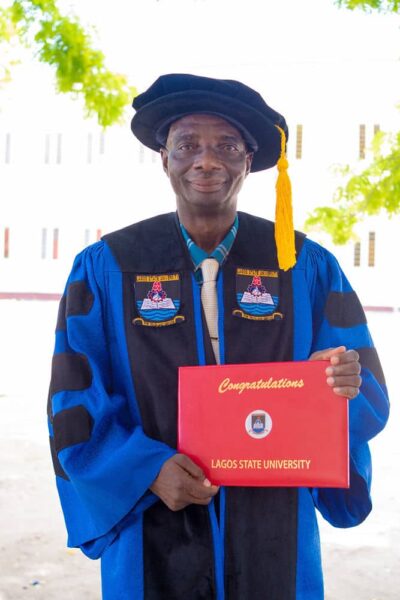
However, permit me to use my liberty assertively, especially if you do not subscribe to my position on leadership. I believe that some people are more naturally disposed to undertaking leadership responsibilities with excellence, while others, irrespective of the extensive training they may have gone through, will always betray themselves and even hide their leadership qualities when critical situations arise. In another category are individuals who remain consistent with their traits because even when they try to hide it, their innate leadership attribute tends to manifest in their behaviour and will always make them behave differently and uniquely. Professor Amidu Sanni sits comfortably in this latter category, and I will tell you how.
I start my argument by pointing out that even when he had no formal leadership responsibility, Professor Sanni facilitated awarding scholarships to indigent students who had challenges in raising tuition fees for their education. He did this to benefit students at Lagos State University (LASU). I should immediately mention that the bursary he got for the students was derived from the Arab world, and we should pay particular attention to this. Usually, people seek opportunities from such bodies to advance their provincial objectives. Therefore, some will not pursue such a project so long as they know that they will not directly benefit from the complementary opportunities. This strengthens the position that leadership qualities are innate.
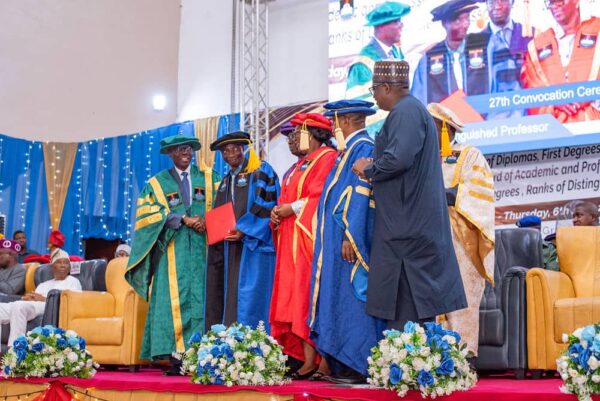
Through Professor Sanni’s pursuit of such a project, it is clear that although he may not have occupied specific leadership roles where using his influence for the betterment of humanity is expected, he still demonstrates that he does not need such a role to add value to human lives. In essence, it is very courageous and even charitable of the eminent scholar to use his influence, which was built because of consistency and mutual interdependence with the Arab world, to benefit defenceless people seeking to access education but without the financial resources to pursue their goals.
Remarkably, Professor Sanni’s institutional influence is not constrained by geographical borders or limitations. At some point, he ensured that scholarship opportunities, sourced from the Arab world, were extended to Arabic students in Morocco. When questioned about the reason for his selflessness and why he prioritises the human family, he would smile and resort to his classic response, “Helping humanity should be the most important pursuit of every individual”. I have personally learnt from this position that it is rewarding to prioritize the progress of others; after all, God has a way of compensating people involved in that business. Professor Sanni has demonstrated that seeking greater support for individuals and initiating transcendental and transformative projects is an act of humanitarian compassion that can have a lasting impact on their lives and successive generations.
This situation can be likened to planting a tree, as most trees planted by individuals will outlive them. Meanwhile, the benefits of planting such trees will not be reaped only by the individuals who planted them. Among other things, the tree could provide topographic security for people at some point in time. To that end, they will give extended protection to people who come under them when they are in desperate need of its protection. Now, is it not awe-inspiring that the products who have benefited from Professor Sanni’s efforts have become great in various fields today?
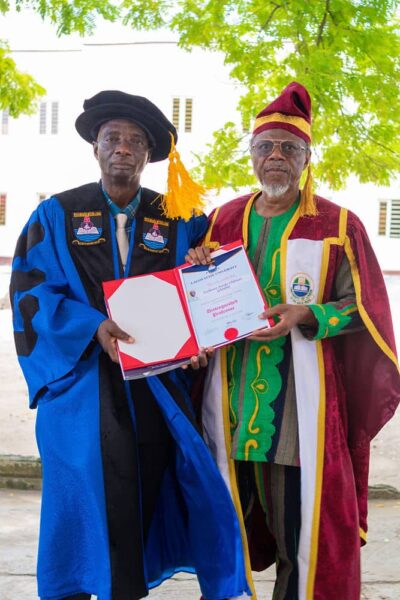
Professor Sanni was a vibrant member of the governing council of LASU in 2008, and the record of his outstanding contributions is available for anyone to see. During that period, the invaluable professor offered his professional expertise in the forms of policy advice and recommendations, which were mostly adopted for the enhancement of improved academic culture in the institution. LASU has always relied on the profundity of Professor Sanni’s contributions, and they make no pretence about it because they understand that the magnitude of what he has to offer cannot be quantified, and they have always wanted to be the primary beneficiaries of his greatness.
Having already experienced firsthand his invaluable ideas and values, LASU has entrusted many other great leadership positions in the care of this brilliant man, whom they have benefited immensely from his exemplary leadership. Perhaps Professor Sanni’s earlier leadership activities consolidated the reason he was eventually chosen to represent at higher positions, where he managed a more complex structure dotted by an expanse of reasonable people. I say this because the position of Vice President of the Quality Assurance Project at LASU came with enormous responsibility for Professor Sanni and left no room for underperformance. It was a widely recognised notion that succeeding without tarnish in those circumstances and areas was due to his appreciable leadership capabilities.
Professor Sanni was once the Head of the Department of Foreign Languages at the same university, and records of how he fostered a harmonious relationship with the different eggheads remain undefeated. This speaks of the value of a man who understands the principles of egalitarian behaviour and possesses native intelligence to realize how critical and central it is to maintain orderliness by appropriating the right values in a complex setting. By adopting this approach, he was able to effectively utilise the right ideological philosophy to govern the department. There should be no surprise that he was accorded the grace to serve in a greater capacity and to use his wealth of experience to change the face of things, given how he successfully piloted the affairs of the department at this level.
Although bigger offices come with higher perks, they are also laden with heavier tasks and increased responsibilities; therefore, each level of responsibility demands greater authority and willingness to adapt to the ecological context at that level. When Professor Sanni transitioned from Head of Department to Dean of his faculty, he came with the philosophy that when a man finds himself in a bigger room, he should upgrade the size of his ideas rather than add to the properties of his biology. As Dean of the Faculty of Arts in LASU between 2004 and 2006, the record of Professor Sanni’s transformative impact remains remarkable to date.
His colleagues love him, and his popularity among students “spreads like wildfire”, alluded to by the great writer Chinua Achebe in Things Fall Apart while referring to the explosive popularity of Okonkwo, the protagonist of the novel. Before he was made the Dean of his faculty in 2004, Professor Sanni had previously held the position of Dean of the Division of Students Affairs at the same institution, where he introduced balance that brought peace between the management and the student community. Those familiar with the academic landscape of Lagos know that it takes an extraordinary effort to pilot affairs there with resounding success. Calm in outlook, the exemplary Professor’s disposition to things has consistently followed this arrangement. He embodies the idea that humans can achieve whatever they desire without necessarily creating a chaotic atmosphere that puts others at a disadvantage.
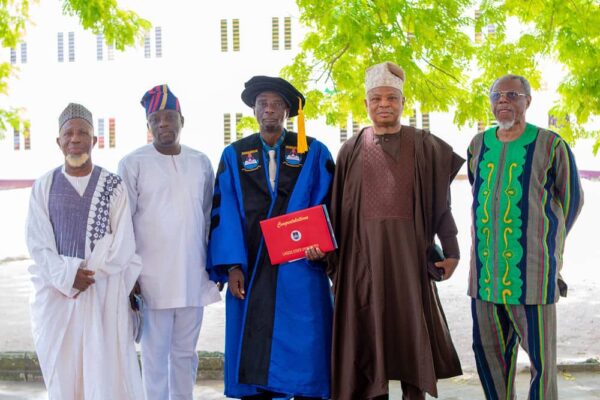
As Professor Sanni goes about his day-to-day engagements, both private and public institutions watch him keenly, waiting for the right opportunity to draw from his well of wisdom and enjoy his leadership qualities by placing bigger responsibilities at higher levels in his hands. It is within this context that his appointment as the Vice Chancellor of Fountain University, Osogbo, makes meaning. Apart from his intimidating credentials, his vast knowledge, influence, potential, and social capital are the reasons he emerged as the best choice among the plethora of candidates who wanted the same position. Truly, he did not disappoint his employers as he introduced transformative and innovative ideas that restructured the school’s educational and ideological outlook.
Dear readers, it has given me great pleasure to write about this man whose excellence is simply undeniable.
PS: This is Part 3 and the conclusion on Professor Sanni, who was elevated on June 6, 2024, as a Distinguished Professor at Lagos State University. A few days later, his family was blessed with a baby boy, Fawzan, a name that captures his multiple successes in recent years.
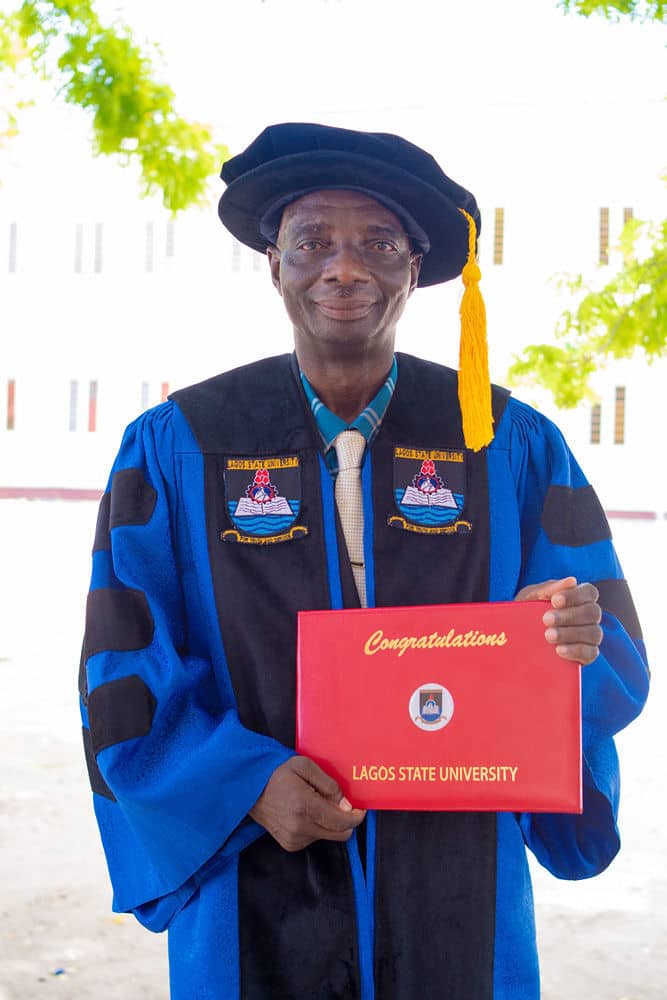
Congratulations Sir.
الى الامام إن شاء الله
Congratulations Sir.
الى الامام إن شاء الله
Your article holds promise with its insightful ideas and solid points. To unlock its full potential, consider delving deeper into the topic. Your clear writing and innovative approach are commendable, but injecting more energy could make it even more captivating. While your examples are effective, infusing them with more enthusiasm could truly elevate your piece. Overall, your article is well-crafted yet has room for enhancement. Strengthening your arguments and incorporating more compelling facts will further bolster its impact. With your evident talent, the potential for greatness is clear. I eagerly anticipate your future work and am excited to see how you continue to excel. Keep up the excellent work!
Hi there, just became alert to your blog through Google, and found that it’s really informative I am gonna watch out for brussels I’ll be grateful if you continue this in future Numerous people will be benefited from your writing Cheers!
Professor Sanni has always been a pool of knowledge . He is my neighbour in Ijanikin as my house is just opposite his.
In the community, he remains an elder statesman. Making sure there is peace and tranquillity in our neighbourhood.
May Allah bless him.